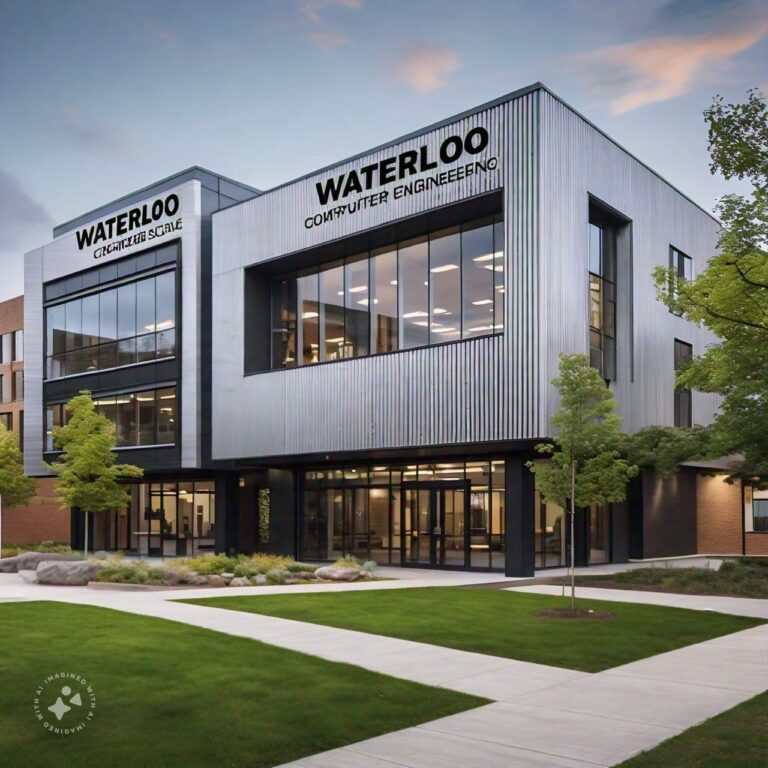
Differences Between Waterloo Computer Science and Computer Engineering Program
The University of Waterloo is globally recognized for its strong programs in technology and engineering, particularly its Computer Science and Computer Engineering programs. Both programs are housed within the Faculty of Mathematics and the Faculty of Engineering, respectively, and offer world-class education that combines theoretical knowledge with practical experience. Students at Waterloo benefit from the university’s co-op program, which provides opportunities for paid internships, allowing students to gain real-world experience alongside their academic studies. This has made Waterloo a top destination for students interested in tech careers, particularly in fields such as software development, artificial intelligence, cybersecurity, and hardware design.
The Waterloo Computer Science program is housed in the David R. Cheriton School of Computer Science and focuses primarily on software, algorithms, and the theoretical foundations of computing. Students develop skills in programming, data structures, algorithms, and systems design, with opportunities to specialize in areas such as artificial intelligence, data science, and cybersecurity. On the other hand, the Computer Engineering program, offered through the Faculty of Engineering, integrates computer science principles with electrical engineering to provide students with the skills to design and build hardware and software systems. This includes everything from embedded systems and microprocessors to networks and communication technologies. While both programs share similarities, they have distinct focuses and cater to different career paths.
Waterloo Computer Science Overview
The Computer Science program at the University of Waterloo is one of the most prestigious and competitive programs in Canada and internationally. It focuses on software development, algorithms, and computational theory. Below are five key aspects of the Waterloo Computer Science program, highlighting its strengths and opportunities for students.
1. Curriculum and Core Courses
The Waterloo Computer Science curriculum is designed to give students a strong foundation in programming, software engineering, and algorithm design. Core courses include data structures, algorithms, operating systems, software architecture, and databases. Students also take courses in mathematics, including calculus, algebra, and discrete mathematics, which are crucial for understanding computational theory.
- Core Courses: Data structures, algorithms, and operating systems are key components of the curriculum.
- Mathematics Integration: Mathematics courses like calculus and algebra provide the theoretical foundation needed for advanced computing topics.
2. Specializations and Electives
The program offers various specialization streams, allowing students to tailor their education based on their interests. Popular specializations include artificial intelligence, machine learning, cybersecurity, data science, and human-computer interaction. This flexibility enables students to focus on emerging areas of computer science and gain expertise in fields that are in high demand in the tech industry.
- Artificial Intelligence: Specialization in AI includes courses in machine learning, neural networks, and natural language processing.
- Data Science: Courses in data analysis, big data, and statistics prepare students for careers in data science and analytics.
3. Co-op and Internship Opportunities
Waterloo’s renowned co-op program allows computer science students to alternate between academic study and paid work terms. This gives students up to two years of work experience by the time they graduate. Many students work at top tech companies, including Google, Microsoft, Facebook, and Amazon, gaining valuable experience in software development, data science, and other tech roles.
- Co-op Program: Offers students real-world work experience through internships at leading tech companies.
- Work Experience: Students graduate with up to two years of relevant work experience, making them highly competitive in the job market.
4. Research and Innovation
Waterloo is known for its research output in computer science. Students have the opportunity to work with faculty on cutting-edge research in fields like cryptography, quantum computing, and robotics. The university encourages undergraduate students to get involved in research projects, providing them with experience that is valuable for those considering graduate studies or research-oriented careers.
- Research Opportunities: Students can participate in research on topics like cryptography, quantum computing, and machine learning.
- Innovation Hub: Waterloo’s proximity to the Toronto-Waterloo tech corridor offers students access to startups and innovation ecosystems.
5. Career Prospects for Graduates
Waterloo Computer Science graduates are highly sought after by employers globally. The program has a strong reputation for producing skilled software developers, data scientists, and AI experts. Many graduates go on to work at top tech firms, while others pursue entrepreneurial ventures or further studies at prestigious institutions. The program’s strong co-op placement rate ensures that students graduate with both the skills and experience needed to succeed in the tech industry.
- High Employability: Graduates are in demand at leading tech companies and startups around the world.
- Career Flexibility: The breadth of the curriculum prepares students for roles in software engineering, data science, cybersecurity, and more.
Computer Engineering Program Overview
The Computer Engineering program at the University of Waterloo offers a comprehensive education that combines computer science with electrical engineering. This interdisciplinary approach equips students with the skills to design and build both hardware and software systems. Below are five key aspects of the Computer Engineering program at Waterloo.
1. Curriculum and Core Courses
The Waterloo Computer Engineering curriculum covers both the hardware and software aspects of computing. Core courses include digital logic design, microprocessors, embedded systems, computer architecture, and signal processing. The program also includes courses in electrical engineering, such as circuits and electronics, providing students with a strong understanding of how hardware interacts with software.
- Hardware and Software Integration: Courses like microprocessors and embedded systems focus on the intersection of hardware and software.
- Electrical Engineering Foundations: Students gain knowledge in circuits, electronics, and signal processing, essential for designing computing hardware.
2. Hands-On Learning and Labs
The Computer Engineering program emphasizes hands-on learning through laboratory work and practical projects. Students build their own hardware systems, design circuits, and program embedded systems. This hands-on experience is essential for understanding the real-world applications of engineering concepts. Waterloo’s state-of-the-art labs provide students with access to cutting-edge technology and tools for hardware design and testing.
- Laboratory Experience: Students gain practical experience by working in labs to build and test hardware systems.
- Real-World Applications: Projects involve designing and programming embedded systems, giving students a practical understanding of computer engineering.
3. Co-op and Industry Experience
Like the Computer Science program, the Computer Engineering program at Waterloo offers extensive co-op opportunities. Students work in a range of industries, including telecommunications, automotive, aerospace, and consumer electronics. Co-op placements allow students to apply their knowledge in professional settings, giving them valuable industry experience before they graduate.
- Industry Exposure: Co-op placements in sectors like automotive, telecommunications, and aerospace provide students with hands-on experience.
- Diverse Roles: Students work in roles ranging from hardware design and systems engineering to software development and network architecture.
4. Specializations and Electives
The Computer Engineering program offers flexibility through various elective courses and specialization streams. Students can focus on areas like embedded systems, computer networks, VLSI design, and robotics. This allows them to tailor their education to match their career goals, whether they are interested in hardware design, network architecture, or systems engineering.
- Embedded Systems: Specialization in embedded systems prepares students for careers in automotive, medical devices, and consumer electronics.
- Computer Networks: Focus on network design and architecture, with courses in telecommunications and wireless communications.
5. Research and Innovation Opportunities
Computer engineering students at Waterloo have the opportunity to work on research projects in areas like nanotechnology, quantum computing, and robotics. The program encourages students to engage in innovation and entrepreneurial activities, and many students participate in startups or collaborate on projects within the university’s research institutes.
- Research Opportunities: Students can work on cutting-edge research in fields like quantum computing and robotics.
- Entrepreneurial Ecosystem: Waterloo’s innovation ecosystem supports students interested in launching startups or developing new technologies.
Differences Between Waterloo Computer Science and Computer Engineering Program
- Focus
- Waterloo Computer Science: Primarily focuses on software development, algorithms, and data structures.
- Waterloo Computer Engineering: Focuses on both hardware and software, integrating computer science with electrical engineering.
- Core Curriculum
- Waterloo Computer Science: Courses in programming, data structures, algorithms, and artificial intelligence.
- Waterloo Computer Engineering: Courses in digital logic design, circuits, embedded systems, and microprocessors.
- Career Paths
- Waterloo Computer Science: Graduates often pursue careers in software development, data science, and AI.
- Waterloo Computer Engineering: Graduates typically work in hardware design, embedded systems, and telecommunications.
- Mathematics Requirements
- Waterloo Computer Science: Strong emphasis on advanced mathematics, including calculus, algebra, and discrete math.
- Waterloo Computer Engineering: Includes mathematics but focuses more on engineering applications.
- Specializations
- Waterloo Computer Science: Specializations include AI, machine learning, data science, and cybersecurity.
- Waterloo Computer Engineering: Specializations include embedded systems, computer networks, VLSI design, and robotics.
- Laboratory Work
- Waterloo Computer Science: Less emphasis on labs, more focus on software development.
- Waterloo Computer Engineering: Heavy emphasis on hands-on labs and hardware design projects.
- Co-op Opportunities
- Waterloo Computer Science: Co-op roles mainly in software development, data science, and cybersecurity.
- Waterloo Computer Engineering: Co-op roles in hardware design, embedded systems, and network engineering.
- Industry Relevance
- Waterloo Computer Science: High demand in software and tech industries like finance, AI, and e-commerce.
- Waterloo Computer Engineering: High demand in telecommunications, aerospace, automotive, and hardware manufacturing industries.
- Research Focus
- Waterloo Computer Science: Research focuses on AI, data science, and cryptography.
- Waterloo Computer Engineering: Research focuses on hardware design, nanotechnology, and robotics.
- Hands-On Projects
- Waterloo Computer Science: Primarily software-based projects.
- Waterloo Computer Engineering: Focuses on hardware-software integration projects, including circuit design and embedded systems.
Conclusion
FAQs
Related Topics
- All
- Animals
- Diseases
- Health
- Money
- Politics
© 2024 OnYelp.com. All rights reserved. Terms and Conditions | Contact Us | About us





